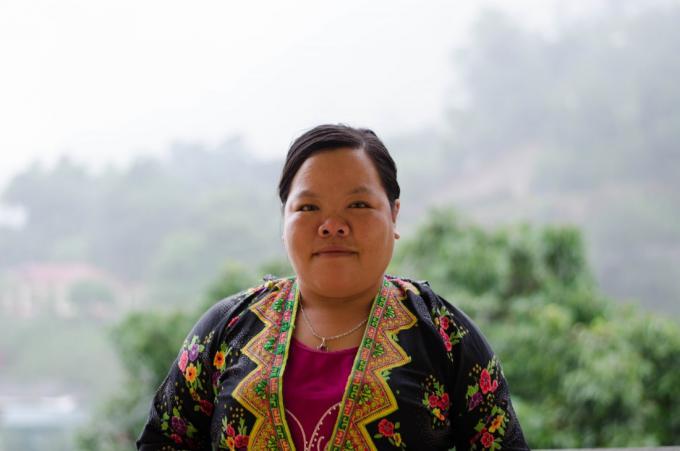The story of a H'Mong health worker in mountainous area
Ms. Giang Thi Phia, a young H’Mong woman aged 32, works as a Village Health Worker at the Tram Tau Commune Health Centre. With the support of GSK, Phia received training to improve her skills and knowledge of maternal and newborn care. Together with 99 village health workers and birth attendants, Phia was enrolled in a four-day training on Behaviour Change Communication organised in July 2017.

She recalls that before the training: “I was totally confused confused. I did not know clearly how and what I should do to help the mother giving birth in front of my eyes.”
“I have never seen a case of infant death since I started my career as a health worker in my village. Regularly, I visit households with women who are at reproductive age to provide support if they need. I also provide care and advice to women who are pregnant and have just given birth. If there is an emergency, I must take responsibility, though my knowledge is limited.”
“I participated in a theoretical training organised by Yen Bai Department of Health and a clinical practice at Tram Tau District Health Centre. It was an intensive training and I learned a lot,” said Phia. “What I learned from the trainings covered the gaps in my knowledge and built up my confidence”.
“Since the last training, I have supported three pregnant mothers to deliver at home successfully. It is a happiness to witness and welcome a newborn infant to the world. ‘Can you do this?’ the relatives of the mothers are always asking me. I answer them with confidence, ‘For sure, I can!’”
Phia said that she was happy to see changes in customs and beliefs of the local people. Previously, they do not allow strangers to touch the mothers and newborns as they believe that it is not good for their health. “They changed because they do not want to see bad things happen to the mothers and children and they believe in me. I also learned communications skill during the training and now I know how to persuade them.”
“I know how to apply safe practices. I would ask them to give me a clean home delivery package if they have or guide them how to sterilise tools by using boiling water. Confidently, I guided the whole family of pregnant mothers to go through the process to deliver the baby successfully. That’s what I already practiced many times in the on-the-job training. And, more importantly, now I can see which case I can deal with and which case needed to transferred to commune health centre immediately. I also provided them with care after birth to ensure that they remain healthy. There is no problem with the three cases that I attended,” underlined Phia. “The children are growing healthy and strong”.
Ms. Nguyen Thi Mai Phuong, Head of Tram Tau Commune Health Center and Phia’ s line manager, added that such trainings were very good and the capacity of her staff was improved a lot. “They reacted faster and more confidently in case of emergency. The quality of their advice to the pregnant mothers is also improved. This contributed a lot to the overall improvement in the health of mothers and children in our commune. Our commune health centre received pregnant mothers from both our and nearby communes to deliver birth. They now believed in our ability and capacity. As of the end of September, there are 46 cases of birth delivery in our commune. 36 of which have taken place at health facilities and the remaining were supported/attended by village health workers and skilled birth attendants”.
Despite those achievements, Phuong and Phia wished there could still be future support from the project. They really want to see more health workers and staff trained in order to improve the health of even more mothers and children. More communication activities should also be organised so that local people have better understanding about all issues related to birth delivery and care for mothers and newborn after birth. And if the project ends, they wish to share their experiences and even provide training for more health workers and staff at their levels. “The project brings a clear and significant difference in the community,” Phuong concluded.
 Vietnam
Vietnam